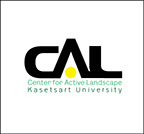
RESEARCH PROJECTS
Our research focuses on how to create physical and social environment on different scale (public places, neighborhood, and cities) that are great for improving the quality of life. Currently we are working on two different topics: climate change adaptation and physical activity. These two domains are interrelated as we try to establish the link between global environment change and its effects in people's quality of life in general and public health in particular. The followings are some of our recent research projects.
Climate Change Adaptation in Cities
Built Environment and
Physical Activity
The project is a regional research project aimed to understand the Urban Heat Island (UHI) effects and their implications to climate adaptation and mitigation strategies for planning policy in major Southeast Asian cities. Its purpose is to mainstream climate considerations in urban planning policy in Southeast Asian cities. The case studies selected for the project are Bangkok (population: 7 million) and Bandung, Indonesia (2.4 million). The Project was funded by Asia Pacific Network for Global Change Research.
Integrating Micro-Climate Mitigation Strategies into Urban Planning Practices: Assessment of the Urban Heat Island Effect of Bangkok Master Plan 2013
(2015-2016)
The main focus of the study is on the assessment of the UHIs effect in Bangkok based on the master plan 2013. The study argues that the new master plan of Bangkok did not consider the climate mitigation aspects and will increase the intensity of UHIs in Bangkok and the demands for cooling load in the city. It will analyze the current temperature rise in Bangkok Metropolitan Area based on the current land use condition and based on the new master plan. It will also analyze the influence of UHIs on the future building cooling demand in Bangkok. The project was funded by Kasetsart University Research and Development Institute (KURDI).
Assessment of UHI Effects after Implementing Master Plan in Major Cities of Southeast Asia: A Case Study of Bangkok, Thailand (2014-2015)
The project was a joint research project between Kasetsart University in Thailand, Hiroshima University in Japan, and Universiti Teknologi Malaysia in Malaysia. Using three cities from three countries, the project assessed the Urban heat island (UHI) effects of the master plan of these cities, should they were implemented. WRF and GIS modelling were used to find out the impact of the master plan to the incidents of UHI in these cities. The project was funded by Mitsui Grant of Japan.
Exploring the role of urban and community parks to public health and physical activity in Bangkok(2017-2018)
The project aims to re-conceptualize the urban and community parks as the center of promoting physical activity, especially in in urban area, where the city infrastructure provides almost none to support physical activity. It is argued that in Bangkok, clustering physical activity campaigns in the urban and community parks will broaden the current efforts on advocating the issue. This is because public parks offer a unique setting, providing opportunities for physical activity, enjoyment of nature, and social interaction compared to any other public infrastructure. The project was funded by Physical Activity Research Center of Thailand (PARC).
Promoting Physical Activity in Urban Park: Planning and Designing for Benjakitti Park, Bangkok
(2016-2017)
The proposed project is an action-research project aims to shift the paradigm of urban green space planning, design and management to provide support to physical activity. The general objective of the project is twofold. First is to increase the awareness of the general public on the importance of physical activity by providing appropriate infrastructure to create conducive environment for physical activity. Second is to mainstream the ThaiHealth physical activity strategies by using urban and community parks as the place-based strategies complementary to interest-based ones (e.g. sports related strategies) into policy, legal and institutional structures related to the health in all policies. The project was funded by Thai Health Promotion Foundation (ThaiHealth).
Active Environment for Active Living: Promoting Built Environment Conducive to Physical Activity Case Study of Urban and Community Parks
(2014-2015)
The project proposes to change approach in the urban and community park planning and design to be more sensitive to user needs especially to support physical activity. The purpose of the project is to provide guidelines for planning, designing, and managing urban and community parks for physical activity. The project will assist Thai Health Promotion Foundation (ThaiHealth) and its partners to develop appropriate interventions and measures to ensure the sustainability of the park and continuity of use for physical activity. The project was funded by Thai Health Promotion Foundation (ThaiHealth).
CONTACT US

Center for Active Landscape
Dept. of Landscape Architecture,
Faculty of Architecture
Kasetsart University
50 Ngamwongwan Rd Ladyao Jatujak
Bangkok, Thailand 10900